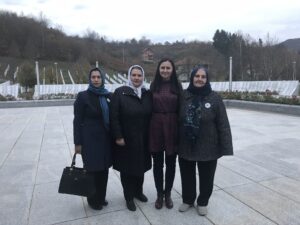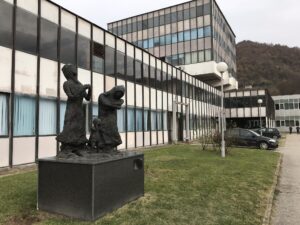The Mothers of Srebrenica A stark reminder of where unchallenged prejudice can lead

by Sarah Robinson Galloway
I know a lot of strong women. Women who fight for equality to have their voices heard; women who will do anything for their families; women who have been through hardship but keep going; women who had their own businesses in times when this was unheard of; and women who quietly get on with their lives but would be the first to be there for you – no matter their own circumstances.
The women I met at the Potočari Cemetary, survivors of the genocide in Srebrenica, take the description of strong women to another level. The Mothers of Srebrenica are the women I describe above and so much more. They lost husbands, fathers, brothers and sons in the cruellest way imaginable but yet they repeat their story again and again in a fight to find their loved ones, bring them to peace and to ensure that this atrocity never happens again.
These are women who were let down by the only people they could trust. They had no choice but to be separated from their loved ones, only to hope that they would someday be reunited. They have spent the last 25 years fighting for recognition that what has happened to them and their families was genocide.
While there is consensus among the international community that these acts do indeed constitute genocide, those closest to them do not. There are neighbours and colleagues who refuse to talk about the subject – even going so far as to deny the atrocities.
Exacerbating this problem, we were told that there has been an entire generation of children whose education on this bloody period of recent history has only served to entrench polarised views. Convicted war criminals such as Ratko Mladić and Radovan Karadžić are not treated as such, but rather glorified as military heroes. As a result, victims of the genocide are today still confronted by outright denials that these events took place. Some even go as far as to say that those who have still to be found are simply happily living out their lives elsewhere.
When listening to the stories of these women it is hard to believe anyone could deny what happened to them. The story of one mother who only had two little bones of her son to bury as the remainder of his body is still lost; another told us of the 23 relatives she lost in July 1995, three are still missing; the mother whose husband and only son are buried at Potočari and who has continued to live her life for them; and finally the mother who had to walk to Srebrenica for 22 days only two days after giving birth, who had another child two years later and was then widowed and became a single mother at 27. This woman is younger than my mother, her daughter is younger than me and her granddaughter is the same age as my daughter.
We see these things happen and think that could not possibly happen here. However, these are people just like any others and the events that led to the Srebrenica genocide may at the time have appeared as relatively minor. It started with dissatisfaction, with prejudice, with discrimination, with an intolerance of difference and with fear. These are all things we still see in society today but listening the Mothers of Srebrenica and to other survivors we can learn what the cumulative effect and end result might well be.
We all, no matter what our age, have the responsibility to listen to the stories of these women and other survivors of this genocide and of the Bosnian conflict. Youth Workers, teachers and parents have the responsibility to tell young people about it, to remind them of what can happen if hate-filled behaviours are allowed to continue.
After the Holocaust we said ‘never again’. But it did happen again. We allowed it to happen again. If we are not careful and don’t take the time to listen and learn, it will continue to happen. We need to challenge prejudice, discrimination and hate of all kinds at every turn as the Very Rev Dr Lorna Hood, Chair of Remembering Srebrenica Scotland, said;
Marking this event with a moment’s silence, lighting a candle or saying a prayer from your faith community shows solidarity not only with our friends in Srebrenica and the surrounding villages and towns but also with the Bosnian community here in Scotland. Yet marking is not enough. We must endeavour to fight racism and hatred wherever we encounter it only then will we be able to truly say never again.

